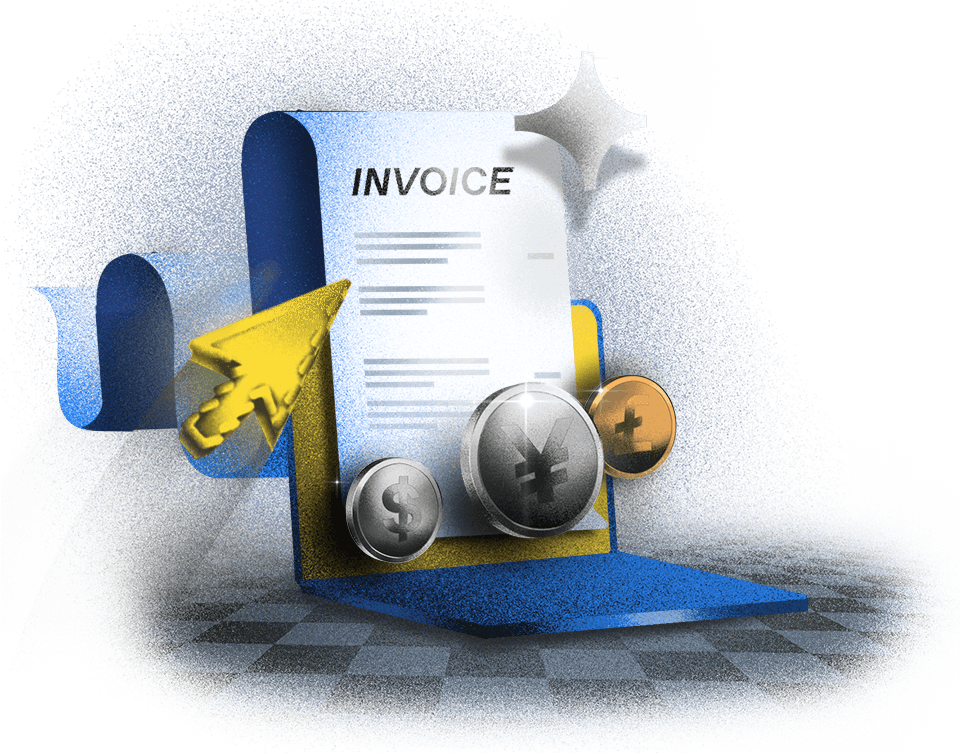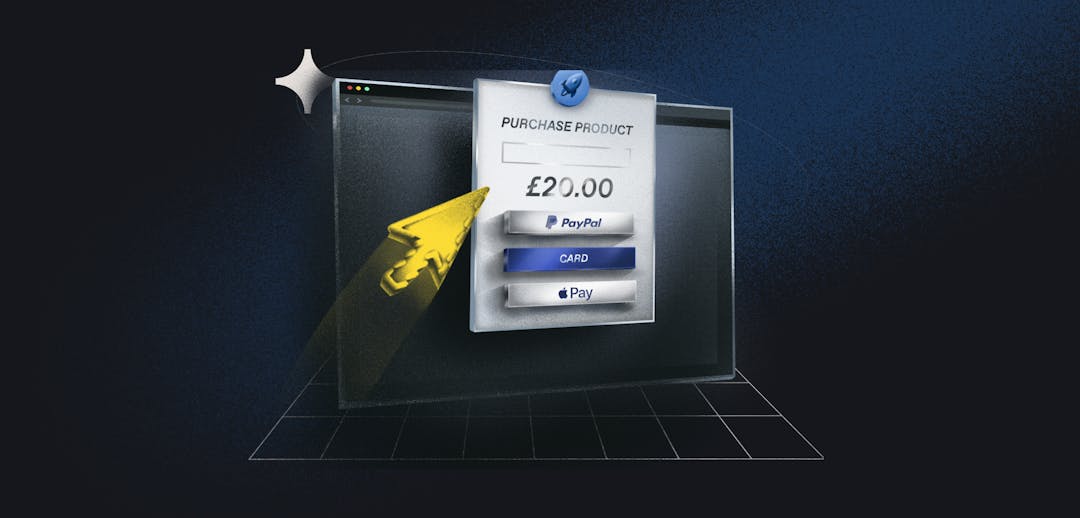B2B payments are usually more complex, and bigger than B2C payments. Finding a great B2B payment processor is important to your growth and success.
The way you process B2B payments matters. To keep your company thriving, you need a fast, reliable method for collecting payments for services rendered.
Understanding the intricacies of the B2B payments process and the solutions that can help will ensure that you’re never struggling to receive these payments. But with so many B2B payment solutions available, it can be difficult to figure out which one is the best fit for your business.
In today’s article, we’ll help you assess the most powerful business-to-business payment options out there. First, we’ll talk through how B2B payments work and how they differ from B2C payments to provide a bit of context. Then, we’ll cover 10 payment solutions that can help you get a better handle on your subscription billing.

What are B2B payments?
B2B payments (or business-to-business payments) are transactions between two merchants. B2B payments are conducted between corporations, startups, retailers, wholesalers, etc., with unique transactional requirements in mind. While similar to business-to-customer (B2C) payments, B2B payments have additional processes in place that make them more complex.
How B2B payments differ from B2C payments
When businesses make payments to one another, more steps are involved in processing each transaction that go beyond those traditionally found in B2C payments. These steps are in place to mitigate potential issues that arise as a result of the scale, method, and contract of B2B payments. Understanding these underlying rules help you get a handle on why certain platforms provide the features that they do.
Volume
B2B payments are traditionally much larger than B2C payments. Research has shown the average B2B ACH debit transaction to be $41,118, while the average for consumers was $44.
Type of contract
B2B payments are under more scrutiny than B2C payments. There are more rules and regulations dictating how and when payments are made, as well as the payment method being used. Whether it’s contractual obligations or federal oversight, these regulations result in the need for more process standardization that typically wouldn’t exist in the business-to-consumer payments space.
Payment method
The payment method usedfor B2B payments is more important than the method used for B2C payments. When B2B payments fail, it means the purchasing company will likely lose a vital component of their business infrastructure. Business-to-customer payments also tend to be more variable than B2B payments, where contracts define the payment terms. Understanding the B2B payment landscape and how it differs from B2C payment systems helps you nail down which platform is the best fit for your business.
5 ways businesses collect B2B payments
There are a number of different methods for processing payments between two businesses. We’ll explore the top 5 most common B2B payment methods and how they impact your business.
Credit cards
Credit card payments are a standard way to collect payments online for lots of businesses, including SaaS providers and ecommerce subscription platforms. While they are a reliable payment method for B2B companies, most credit card payments come with percentage fees. When you’re processing a significant volume of payments, these fees can compound quickly to become too expensive.
Some credit cards will also have a maximum transaction limit, making it impossible to process larger payments. Hitting the credit card limit can also lead to delinquent churn, one of the biggest contributors to SaaS and subscription churn.
Bank/Wire transfers
Bank and wire transfers are secure payments between financial institutions. These types of payments typically take a lot of work to set up but, once completed, are very reliable. While there are fees involved in these kinds of transfers, there is no limit to the amount that can be sent between banks.
Checks
Checks may feel antiquated, but there are businesses that still accept them as payment. While this is a reliable and easy-to-track payment method, checks do take a lot of time to process. There is also more room for error with handwritten paper checks due to poor handwriting and the lack of an electronic paper trail.
Any physical form of payment like this brings up logistical issues as well. You’ll either have to deliver the check in person or mail it to the other business, both of which add a layer of overhead to an already complicated process.
Cash
Cash payments are the least reliable and most cumbersome method for B2B payments. Anything over a few hundred dollars will be difficult to keep track of in transit. That, combined with the fact that large cash payments have significant regulations regarding their use, makes this a very inefficient way to make B2B payments.
Payment gateways
Payment gateways are the most popular way to process B2B payments—they facilitate financial transactions for your business and make it easy to collect both subscription and one-time payments. While you’ll still rely on a third-party payment service to process these payments, the software available to facilitate these payments is built to streamline the billing process as much as possible.
That said, using a payment platform requires an understanding of exactly what features these tools offer and how they differ—as we’ll cover in the next section.
Top 10 B2B payment processors, solutions, and platforms
From payment gateways and subscription management platforms to merchant accounts and revenue recognition, there are a lot of companies offering different tools to facilitate your B2B payments. To facilitate these various processes, the payments market has grown considerably over the past few years.
Paddle
Paddle provides an all-in-one solution for B2B transactions and billing for selling internationally. As a merchant of record, transacting through Paddle lets businesses offload their sales tax liabilities and the associated admin. Chargebacks and payment fraud issues are also taken care of for you.
- Price: The pay-as-you-go plan charges a 5% + $.50 cent fee for every transaction.
- Functionality: Billing, payments management, merchant account, subscription management, invoicing, sales tax compliance, fraud protection.
- What it lacks: Paddle can only be used for selling software and digital goods and services.
Overall, Paddle is an ideal solution for SaaS businesses that intend to scale into new markets and service customers around the globe.
Stripe
Stripe is one of the most popular B2B payment processors available. Their focus on easy-to-connect integrations and an open API helps streamline the payment process by removing bottlenecks.
- Price: Transactional. Their pay-as-you-go plan charges a 2.9% + $.30 cent fee for every payment made through their platform.
- Functionality: Billing, payment gateway, merchant account.
- What it lacks: Stripe does have some subscription management tools available; you’ll need to integrate their service with a more robust platform through their API for additional functionality.
Overall, Stripe is an easy-to-use platform for small businesses and solo entrepreneurs. It can get pricey as your volume increases, but they do offer custom pricing as your company grows.
Read more about Stripe alternatives and how to decide between PayPal vs Stripe.
Braintree
Braintree’s platform is built to help SaaS companies manage their subscription payments. This focus on subscription makes it an attractive solution for businesses that don’t mind the charge-per-transaction model.
- Price: Transactional. Its pay-as-you-go plan is the same as Stripe, adding a 2.9% + $.30 cent fee to every payment made through their platform.
- Functionality: Billing, payment gateway, merchant account, subscription management.
- What it lacks: Braintree’s reporting and analytics aren’t as robust as other platforms. Due to the transactional nature of their billing, it can also get pricey as your company grows.
Bringing together a wide range of payment methods and international support under one platform, Braintree is a great choice for businesses of any size. It can also connect with third-party payment gateways through their API if you require the ability to process certain types of payments.
Read more about Braintree alternatives
Chargify
Chargify is another subscription payment management platform that focuses on supporting businesses with complex billing processes that change frequently.
- Price: Tiered. Chargify bills a base monthly price plus a percentage of your monthly revenue.
- Functionality: Billing, subscription management.
- What it lacks: You’ll have to integrate a third-party payment gateway and merchant account to Chargify to process payments. Its platform focuses more on subscription analytics and recurring billing—pulling data from your other integrated services.
Chargify is a great payment provider for businesses with an existing payment infrastructure who want to handle on their subscription management better. Using its platform helps you test out different pricing structures quickly and efficiently.
Recurly
Another subscription management platform, Recurly offers five different billing models to help you tailor your pricing plans to the specific type of product or service you sell.
- Price: Tiered. It processes monthly payments in addition to a monthly revenue percentage.
- Functionality: Billing, subscription management.
- What it lacks: Like Chargify, Recurly requires integration with both a third-party payment gateway and merchant account.
Recurly is another B2B payment technology that’s focused on subscription management. It offers revenue recognition tools and dunning features, but they need to be used with a payment gateway to gather data. Due to its price structure, this can make its platform expensive and adds a layer of complexity to your billing infrastructure.
Chargebee
Chargebee is an ideal B2B payment processor for mid-sized businesses. It handles complex pricing structures efficiently and offers a full suite of subscription management and billing tools. Use these tools to refine your pricing strategy as the company grows.
- Price: Tiered. There is a monthly charge for up to a certain revenue plus overage percentages if you go over that level.
- Functionality: Billing, subscription management.
- What it lacks: Chargebee also requires a third-party payment gateway and merchant account.
This is the first platform we’ve looked at that offers a freemium tier for businesses doing up to $50,000 in revenue. Chargebee is known for its ease of use and overall customer experience.
Read more about Chargebee alternatives
Digital River
Digital River is an all-in-one SaaS billing platform with a reliable product offering and diverse feature suite. Its focus is on providing a platform that offers specific solutions for finance teams.
- Price: Available by request. Digital River targets enterprise customers with custom pricing.
- Functionality: Billing, merchant account, subscription management.
- What it lacks: Digital River offers limited account customization options.
As mainly an enterprise solution, Digital River is really only a good choice for larger businesses.
Read more about Digital River alternatives
Netsuite
NetSuite is an accounting platform with CRM and supply chain/inventory management functionality. It’s a great platform for businesses that want to report on as much data about their customer transaction as possible.
- Price: Licensed. As a subsidiary of Oracle Systems, you purchase a license for NetSuite based on the needs of your business.
- Functionality: Billing, subscription management.
- What it lacks: NetSuite does not include a merchant account or payment gateway. Their platform is built as a full-service accounting suite to go on top of a payment platform.
While NetSuite is a complex tool, the sheer amount of data available from its platform is impressive. You’ll be able to use this data to gain a clear understanding of how customers move through your payment process as well as how that impacts your infrastructure.
Apttus
Apttus is a platform that helps you manage subscription payments throughout the sales process, from first contact all the way to completed payment.
- Price: Pricing is only available by request.
- Functionality: Billing, subscription management.
- What it lacks: As more of a sales-oriented tool, Apttus lacks retention features. It also requires integration with both a payment gateway and merchant account.
If you’re looking for a way to visualize how prospects move through your sales process, Apttus is the perfect tool. When you can see that movement in its entirety, it’s easier to diagnose potential issues and optimize your payment cycle.
Zuora
Zuora is a robust subscription management platform that is built to manage the entire customer lifecycle. It offers the most customization options for your digital payment experience.
- Price: Available by request. Zuora offers a number of different products to build custom plans.
- Functionality: Billing, subscription management.
- What it lacks: You’ll need a merchant account and payment gateway to accept B2B payments via Zuora.
While Zuora is a more complex tool, its benefits outweigh the initial learning curve that comes with the tool. Plus, you can get around this challenge with ProfitWell’s Zuora analytics and reporting integration. Investigate Zuora’s add-ons and customizable options to see how you might build a robust payment online platform for your business.
B2B payments FAQs
How are B2B payments made?
B2B payments and transfers can be completed using various methods, but the most reliable ones in today's landscape include wire transfers, credit cards, virtual cards, eChecks, and Electronic Funds Transfers (EFTs). Cash and paper checks are considered less reliable forms of B2B payment.
What are b2b cross-border payments?
Cross-border payments are international transfers between individuals, companies, or banks that operate in different countries. Cross-border payments occur between banks with a corresponding banking relationship.
What are ACH payments?
Automated Clearing House (ACH) is a US electronic network that conducts financial transactions between banks and credit unions. ACH is a preferred option for processing large debit and credit transactions. ACH network is used for a range of fund transfer transactions, such as direct deposits, payrolls, vendor payments, or monthly debits for routine expenditures.




